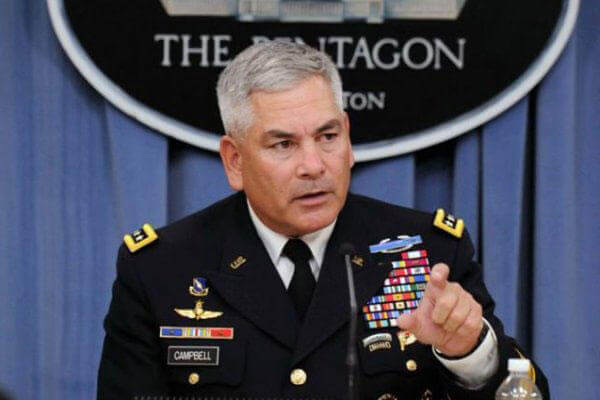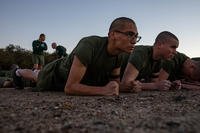The nominee to take command of U.S. forces in Afghanistan warned Thursday that U.S. and coalition forces could pull out completely at the end of this year if Afghan politicians fail to resolve the presidential election crisis.
"If they can't get through this election process, coalition forces will not continue to stay there after 2014," said Gen. John F. Campbell, current the Army vice chief of staff.
Campbell warned that the election impasse could lead to a breakdown of the Afghan National Security Forces along sectarian lines. He spoke at the Senate Armed Services Committee hearing on his nomination to succeed Marine Gen. Joseph Dunford as commander of the International Security Assistance Force in Afghanistan.
"If the election doesn't get resolved,[the Afgan army could] revert to what they've done for years and years – go back to tribal affiliations," Campbell said.
Abdullah Abdullah, a former foreign minister who has support in northern Afghanistan, appeared to have won the first round of the presidential election. However, contested results of the runoff election showed Ashraf Ghani, a former finance minister with support in the Pashtun south, well ahead with 56percent of the vote.
Abdullah has charged fraud, and the outcome was crucial to a continued U.S. presence. Both candidates have said they would sign a Bilateral Security Agreement to keep coalition forces in Afghanistan past 2014, but the election crisis has put the BSA in doubt.
Secretary of State John Kerry was expected to arrive in Kabul on Friday in an attempt to mediate the dispute but the immediate prospects for a peaceful resolution were dim. Kerry has warned of a cutoff in U.S. aid and security assistance if either candidate fails to accept an audit of the vote.
"I don't know what he (Kerry) can do," Abbas Noyan, a spokesman for Ghani's camp told Reuters. "Secretary Kerry will come and talk with both candidates and see what he can do. I don't think he has a road plan for this. Without a road map it is very difficult to solve this problem."
Along with Campbell, the Senate Armed Services Committee also considered the nominations of Army Lt. Gen. Joseph L. Votel to take over U.S. Special Operations Command from Adm. William H. McRaven, and Adm. William E. Gortney to lead Northern Command and the North American Aerospace Defense Command (NORAD).
The critical questioning at the hearing was aimed mostly at White House policies on Afghanistan, border security and counter-terrorism that the nominees would have to follow. Despite those questions, all three were expected to be confirmed easily by the full Senate.
Gortney has been commander of the U.S. Fleet Forces Command, director of the Joint Staff at the Pentagon and commander of the U.S. 5th Fleet.
Campbell has also served as the Army deputy chief of staff and commander of the 101st Airborne Division. He has served two tours in Afghanistan and one in Iraq.
Votel has been commander of the Joint Special Operations Command, deputy commander of the Joint IED (Improvise Explosive Device) Defeat Organization and chief of staff of the Special Operations Command.
Under questioning by Sen. James Inhofe, R-Okla., Campbell defended the controversial $550 million purchase by the U.S. of Mi-17 helicopters for the Afghan forces from the Russian export firm Rosobornexport.
There have been bipartisan proposals to terminate the contract because of Russia's takeover of Crimea and support for Syrian President Bashal al-Assad.
"If we had to change the Mi-17 (program)," Campbell said, "we'd be several years behind and we'd have to start a whole new training program."
Much of the questioning of Campbell concerned President Obama's plan to withdraw all combat forces at the end of this year and leave in place about 9,800 U.S. troops in 2015. That force would be halved in 2016 and there would be no U.S. troops in Afghanistan in 2017 other than Embassy security.
Campbell said he concurred with Obama's plan but it was dependent upon resolving the election dispute.
"We have to identify the president," Campbell said.
Votel told the senators that cutting the rising suicide rates among Special Forces troops, including Navy SEALs, would be one of his top priorities.
Votel said he agreed with McRaven, who said in April that "the last two years have been the highest rate of suicides we have had in the special operations community and this year I am afraid we are on the path to break that."
Neither Votel nor McRaven gave hard figures on the number of special operations suicides, but Votel said that 13 years of high-tempo operations and the secretive nature of special operations missions were likely factors.
"Some of the things we ask of our special operators do not allow them the normal opportunities to talk about things afterward," Votel said.
In his testimony, Gortney highlighted the success last month of the kill vehicle from Ground-based Midcourse Defense (GMD) system in hitting a simulated enemy missile target over the Pacific after several failures.
As NORTHCOM commander, Gortney would have responsibility for the GMD. NORTHCOM "owns the trigger," Gortney said, and much work remains to be done on sensors in the system to discriminate among enemy decoys.
"The shot window is so narrow," Gortney said, putting an emphasis on rapid and effective command and control of the GMD.
-- Richard Sisk can be reached at richard.sisk@monster.com



























